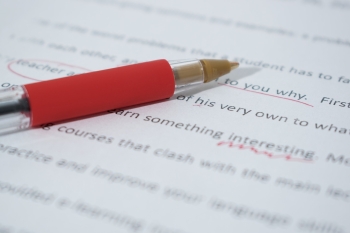Amateur Grammatics – the perils of punctation!
(Posted on 16/02/22)

There are so many ways that you can make mistakes when writing a sentence that involves punctuation. Is a comma needed, or a hyphen? Will dashes do instead of brackets? Everyone has their own thoughts on how punctuation should look and what the rules are – and in some cases, there is a certain flexibility.
Artificial intelligence (AI)
We should all know our ‘their’ and ‘they’re’ from our ‘there’. And most writing software has in-built grammar tools now that flag up and underline any mistakes we make. It even offers grammar suggestions, such as the use of hyphens, or the insertion of commas, which we can choose to heed or disregard. As software and AI becomes more sophisticated, the degree to which our grammar is corrected gets better. AI has even now determined the correct use of the apostrophe, something generations of writers never thought possible.
Overly-hyphenated
Overuse of the hyphen is another aspect of grammar that irritates many people. Are you overly-cautious, or overly-zealous in your usage? Do you even need a hyphen in many cases? It’s another case where there are often no hard and fast rules, and it’s up to the writer’s own preferences and style, which is fine, as long as there is consistency. Some writers think it’s ‘best-practice’, others ‘best practice’, but in the UK it’s definitely not ‘best practise’.
Comma chameleon
Some writers like using lots of commas, for example, to break up sentences as you would pause for breath (if the line was read aloud). While to others, commas are an alien entity, as if the comma key had been removed from their keyboard. The punctation you use is very much dependent on your writing style. If you write in short, clipped sentences, which for clarity is often a good starting point, then you won’t need to use commas that much. Not like in this sentence, that begins talking about one subject, say elephants, but then veers off in another direction, and talks about cake decorating, or landscape gardening, or cats.
Semi-detached
Like commas, semicolons are used to break up text and they are often used to link two interrelated statements. The reasons why this is another woolly case are not clearly defined; again, it’s a matter of taste if you use them or not. Some academic writing tends to deploy semicolons en masse. Often however, it can be preferable to begin a new sentence, rather than tack another statement on the end, but semicolons can be useful, especially if you are typing out a long list of detailed items – e.g. we bought; white sliced bread, Parma ham, Caerphilly cheese, low-fat butter, and some pickled onions.
Clarity is key
In all writing, certainly the type of copywriting we create at Zebra, clarity is key. If the message is lost in the media, then the writer isn’t doing their job properly. Keeping sentences short is a great way of making sure the meaning of your writing isn’t being lost. The longer the sentences, the more room there is for misinterpretation. A morass of punctuation can also create word molasses that the reader must wade through, to get to the meaning, and interrupts the texted flow. So, keep unnecessary punctuation to a minimum. Don’t be too clever, but don’t underestimate the reader either – and don’t overuse exclamation marks! Never!! Ever!!! If you must use them, use them sparingly, as overuse deadens their effect.
We all use the written word every day – for many this is phone messaging, where meaning is paramount and spelling, punctuation etc. are secondary at best, forgotten at worst. This is also leading to an epidemic of bad spelling, which we’ll look at in a later blog post of Amateur Grammatics.







